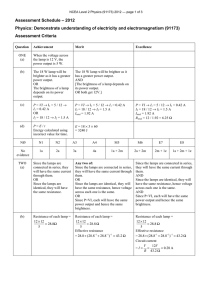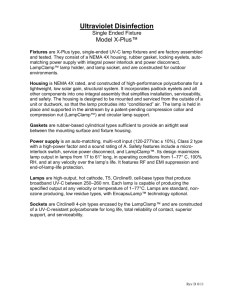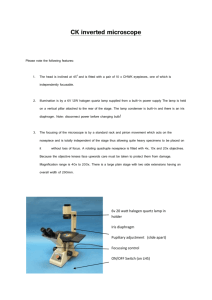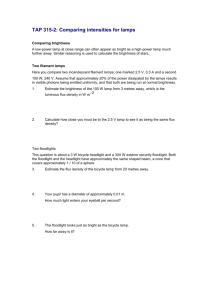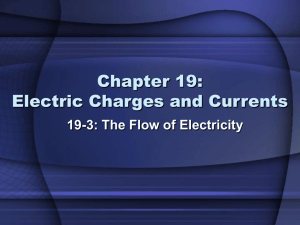NCEA Level 2 Physics (91173) 2012 Assessment Schedule
advertisement
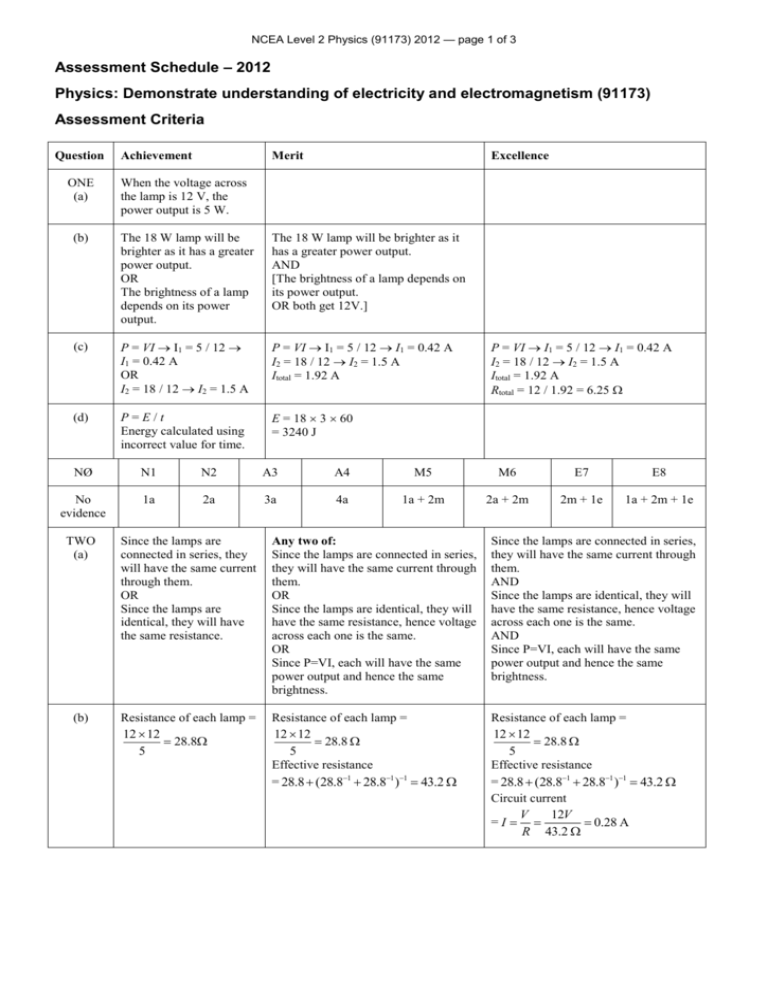
NCEA Level 2 Physics (91173) 2012 — page 1 of 3 Assessment Schedule – 2012 Physics: Demonstrate understanding of electricity and electromagnetism (91173) Assessment Criteria Question Achievement Merit Excellence ONE (a) When the voltage across the lamp is 12 V, the power output is 5 W. (b) The 18 W lamp will be brighter as it has a greater power output. OR The brightness of a lamp depends on its power output. The 18 W lamp will be brighter as it has a greater power output. AND [The brightness of a lamp depends on its power output. OR both get 12V.] (c) P = VI I1 = 5 / 12 I1 = 0.42 A OR I2 = 18 / 12 I2 = 1.5 A P = VI I1 = 5 / 12 I1 = 0.42 A I2 = 18 / 12 I2 = 1.5 A Itotal = 1.92 A (d) P=E/t Energy calculated using incorrect value for time. E = 18 3 60 = 3240 J P = VI I1 = 5 / 12 I1 = 0.42 A I2 = 18 / 12 I2 = 1.5 A Itotal = 1.92 A Rtotal = 12 / 1.92 = 6.25 NØ N1 N2 A3 A4 M5 M6 E7 E8 No evidence 1a 2a 3a 4a 1a + 2m 2a + 2m 2m + 1e 1a + 2m + 1e TWO (a) Since the lamps are connected in series, they will have the same current through them. OR Since the lamps are identical, they will have the same resistance. Any two of: Since the lamps are connected in series, they will have the same current through them. OR Since the lamps are identical, they will have the same resistance, hence voltage across each one is the same. OR Since P=VI, each will have the same power output and hence the same brightness. Since the lamps are connected in series, they will have the same current through them. AND Since the lamps are identical, they will have the same resistance, hence voltage across each one is the same. AND Since P=VI, each will have the same power output and hence the same brightness. (b) Resistance of each lamp = 12 ´ 12 = 28.8W 5 Resistance of each lamp = 12 ´ 12 = 28.8 W 5 Effective resistance = 28.8 + (28.8-1 + 28.8-1 )-1 = 43.2 W Resistance of each lamp = 12 ´ 12 = 28.8 W 5 Effective resistance = 28.8 + (28.8-1 + 28.8-1 )-1 = 43.2 W Circuit current V 12V =I= = = 0.28 A R 43.2 W NCEA Level 2 Physics (91173) 2012 — page 2 of 3 (c) Voltage across Lamp A = V = IR V = 0.28 28.8 V = 8.064 V Lamp A gets twice the current Voltage across Lamp A = V = IR V = 0.28 28.8 V = 8.064 V Voltage across lamps in parallel = 12 – 8.064 = 3.94 V Lamp A gets twice the current because current splits / R the same Voltage across Lamp A = V = IR V = 0.28 28.8 V = 8.064 V Voltage across lamps in parallel = 12 – 8.064 = 3.94 V Power output of Lamp A = P = VI = 8.064 0.28 = 2.25 W Power output of parallel lamps = P = VI = 3.94 (3.94 / 28.8) = 0.54 W Hence lamp A has a greater power output and hence is brighter than Lamps B and C. Lamp A gets twice the current because / current splits / resistances the same and P = I2R NØ N1 N2 A3 A4 M5 M6 E7 E8 No evidence 1 point correct 1a 2a 3a 1a + 2m 3m 2m + 1e 1m + 2e THREE (a) The upper plate has to be positive to prevent the negatively charged oil drop from falling down. OR Electric field is directed downwards, so the electrons will be attracted upwards. The upper plate has to be positive to prevent the negatively charged oil drop from falling down OR electric field is directed downwards, so the electrons will be attracted upwards. AND The force of gravity acts downwards, so the oil drop is held stationary by an equal force acting upwards. (b) The gravity force(weight force) should be equal in size and opposite in direction to the electric force. (c) Fg = mg =2.54 10–5 x 9.8 = 2.4892 10–4 N Fel = Fg = 2.4892 10–4 N E = F / q = 2.4892 10–4 / (3.6 10–9) = 69 144 N C–1 (d) 33 2sf Since the final answer cannot be any more accurate than the least number of sf in the question. OR The least number of sf in the question is 2. Fg= mg =2.54 10-5 9.8 = 2.4892 10–4 N Fel = Fg = 2.4892 10–4 N E = F / q = 2.4892 10-4 / (3.6 10–9) = 69 144 NC–1 E = V / d V = Ed V = 69144 4.8 10–4 = 33.18 V = 33 V NØ N1 N2 A3 A4 M5 M6 E7 E8 No evidence 1a 2a 3a 4a 1a + 2m 2a + 2m 2m + 1e 1a + 2m + 1e NCEA Level 2 Physics (91173) 2012 — page 3 of 3 FOUR (a) (b) The rod will move to the right. The rod will move to the right because the current through the rod which is in the magnetic field will cause the electrons in the rod to experience a force to the right causing the rod itself to move. OR Power supply causes electrons to move through the rod. The electrons are cutting across a magnetic field, so have a force on them. I = V / R I = 12.0 / 35.4 0.34 A I = V / R I = 12.0 / 35.4 0.34 A F = BIL F = 0.85 10–3 .34 18.5 10–2 OR = 0.85 10 .34 25 10 F = 7.2 10–5 N –3 (c) V = BvL V = 0.85 10–3 2.5 25 10–3 V = 5.3 10–4 V (d) The rod slows down and stops. –2 The rod slows down and stops because the induced current in the rod causes an electromagnetic force. I = V / R I= 12.0 / 35.4 0.34 A F = BIL F = 0.85 10–3 .34 18.5 10–2 F = 5.4 10–5 N The rod slows down and stops because the induced current in the rod causes an electromagnetic force. This force is in the opposite direction to the movement, causing the rod to slow down and stop. NØ N1 N2 A3 A4 M5 M6 E7 E8 No evidence 1a 2a 3a 4a 1a + 2m 2a + 2m 2m + 1e 1m + 2e Judgement Statement Not Achieved Score range 0 – 10 Achievement 11 – 19 Achievement with Merit 20 – 24 Achievement with Excellence 25 – 32
